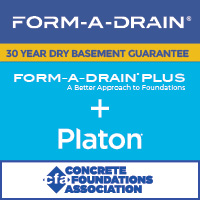Code Corner — ICC Final Hearings
IRC ANCHOR BOLT PROVISIONS REJECTED
The CFA and its industry partners were successful on a major code change at the International Code Council hearings in Rochester, New York this past May. The change, #RB149, repealed the new provisions for closer anchor bolt spacing that were inserted into the 2006 IRC during (literally) a late night maneuver by proponents of the change. This change reinstates the provisions of Section R403.1.6 from the 2003 code regarding foundation anchorage. These provisions state that anchor bolts shall be spaced a maximum of six feet on center; that there shall be a minimum of two bolts per plate section and that one bolt shall be spaced not more than 12 inches from each end of the plate section. This coincides with the provisions of the ACI 332 Standard as well as the CFA Standard.
These provisions have served the industry well for several decades. Statistics regarding failure of walls due to problems with top plate anchorage were collected by the CFA from its members and presented in testimony at the ICC hearings. The statistics covered a five-year period and represented over 200,000 foundation walls installed by over 87 CFA members. There were a total of 41 problems related to top of wall restraint, but not a single one related to failure of the anchor bolt/plate connection under normal loading conditions. The 41 problems represent only 0.02 percent of foundations, hardly cause for concern. When you eliminate the causes that included driving excavation equipment or loaded drywall trucks within three feet of the foundation, or soaking the unbraced and unbackfilled wall with water, the percentage of problems or failures drops to zero. The proposed modifications that initially made it into the 2006 code would require anchor bolts spaced as close as seven inches or less depending on soil conditions adding hundreds of dollars to the average home. This is a classic case of creating a solution to a problem that does not exist.
There are occasional problems with the top of wall connection as described above but if there is a problem, it is more likely to occur from a failure of the deck-plate connection than the plate/anchor bolt connection.
UNDERSTANDING THE PROCESS
Removing a provision from the IRC is not a simple matter. Our proposed revision, which reverted back to the original 2003 wording, was recommended for disapproval by the ICC committee; meaning that it would remain in the code unless our proposed change was accepted. In order to overturn the committee recommendation, a super majority is required. Ed Sauter of the CFA, Steve Skalko of the PCA, and Gary Ehrlich of the NAHB, together with several building code officials spoke against the committee recommendation, and one individual spoke in favor. Each individual has a maximum of two minutes to make their points – either in favor or against. All speakers have another one minute opportunity to refute the first argument. Voting on final action at this meeting is done only by the building officials. The vote was 57 in favor and 77 opposed to the committee recommendation – the first round was won. The next step was a motion from the floor to accept the proposed change. The vote on this motion was 107 in favor and 38 opposed – the change was officially approved.
You might wonder why so little time is allotted to state your case. First, most if not all of the arguments are submitted in writing ahead of time along with the proposed change, so in theory everyone has had the opportunity to review the arguments. Couple that with the fact that there are usually several hundred proposed changes, and some of them, such as the proposal for mandatory sprinklers in all homes, had at least 50 people lined up to offer their opinions, and you can see why time must be limited. The arguments on this sprinkler change (which was defeated) took nearly two hours. You get the point.
CLOSING NOTES
The CFA was unsuccessful in its opposition to allow compacted gravel footings under precast foundations. Sauter was the only one speaking against the proposal and the committee action was for approval.
The CFA will continue to expand its participation in code activities as a service to members. If you have issues with the IRC make sure you get in touch with us. The deadline for submittal of proposed changes to the 2009 IRC is August 20th of this year.







